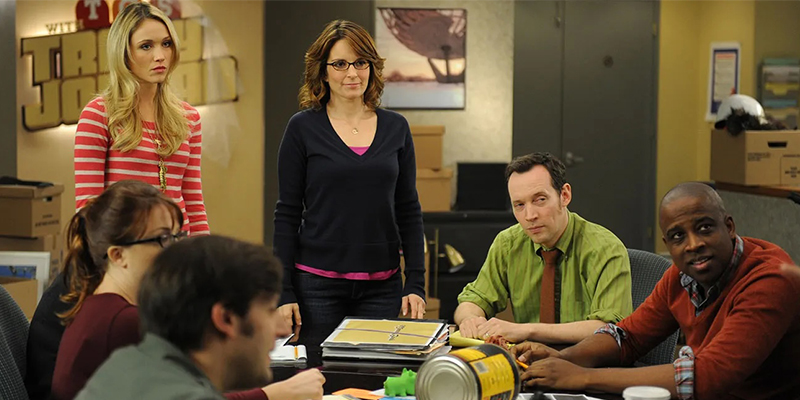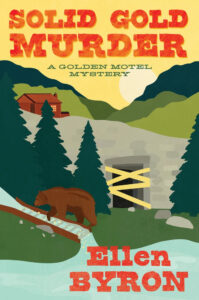In my former life, I was a sitcom writer. So was Dee Stern, the protagonist of my Golden Motel Mystery series. Sharing a backstory with a character gives me plenty of plot ideas. Case in point: the subplot in Solid Gold Murder, Golden Motel Mystery #2, where Dee’s hobby of creating cartoons inspired by a lumbering local bear may lead to an animation pilot deal.
Having written pilots solo and with my TV writing partner for every network, along with several cable outlets, boy did I have fodder for this particular B-story. (“B-story” is what TV people call a subplot, the main plot of an episode being the A-story.) When my partner and I wrote a pilot for NBC, I’ll never forget the joy of receiving a call from our agents on a Tuesday with the wonderful news that the network president loved it. Loved it! This was followed by a shell-shocked call from them on Wednesday to tell us the network president had been fired and his replacement only wanted male-driven comedies. Our pilot centered on a couple living and working together, which somehow made it “female-driven.” In the space of less than twenty-four hours, we went from “network president’s favorite” to dead in the water. But we did get to enjoy a lovely dose of schadenfreude when the show picked up instead of ours was cancelled after only one episode aired, making it one of the most quickly cancelled shows in history.
We were on the verge of having better luck a few seasons later when we wrote a pilot for CBS. I floated on air for a few days after an executive on the project told me, “You’re one of our three favorite pilots.” And then… nothing. For weeks. Until any chance of being put into production faded away and we finally heard that the network wasn’t moving forward with the pilot. I was disappointed but resigned because a pilot script not getting a pickup happens way more often than the reverse. But imagine my surprise a few seasons later when I saw enthusiastic promotion for a new series on the network that had almost the exact same premise as our pilot. Basically, it was our idea with tweaks. Fortunately, I only had to steam with anger for the twelve episodes that the show aired before being cancelled. (TV factoid: with a network series, the initial pickup is for eleven episodes plus the pilot. If the show is doing well, you get a pickup for another nine, bringing the number to the standard network season order of twenty-two episodes. If a show is a hit, the network will ask for a longer season. When I worked on the series Wings, we produced twenty-four episodes a season. The networked wanted twenty-six but twenty-four was already killing us. Of course, streaming has up-ended this model with its orders of eight to ten episodes per year.)
I do have two development stories I can dine out on. One involves an actual meal: lunch with legends Kelsey Grammer and William Shatner.
We’d written a pilot for Kelsey’s production company that had a lead role perfect for Shatner. The development executives were positive that if we took the script out with Shatner officially attached, it would sell in flash. The head of Kelsey’s company tried locking down lunch with Shatner for months. He finally got a date on the books – the day I had to fly back east for my mother-in-law’s funeral. He pled my case to Shatner’s people, but nope. We will never know why but apparently this was only day in the history of days that Shatner was available. So, hundreds of dollars and a rebooked flight later, we sat in a restaurant with Kelsey, my writing partner, and the executive, waiting for the TV legend to join us. He strolled into the restaurant right on time and announced, “I’m not sure the guy I gave my car keys to is a valet.” What followed was a long, hilarious lunch peppered with Kelsey Grammer’s undeniable charisma and William Shatner riffing on where his car might be. We didn’t get around to discussing the pilot until the end of the meal, when Shatner said, “I really like the project. If you sell it, let me know.” Needless to say, without him attached, the pilot went nowhere. But in rejiggering my travel plans, I learned that it’s possible to do a twenty-four hour round trip between the west and east coasts, which I incorporated into the plot of The Witless Protection Program, my final Catering Hall Mystery (a series I wrote under the name Maria DiRico).
We did get a pilot picked up and put into pre-production on the Disney Channel. Our lead character was a girl entering an accelerated high school program who found herself straddling the world between the brainiacs and the popular kids. In the middle of casting, the network decided they wanted the character to be African-American, which we loved. But finding any teen performer who can carry a show is difficult, so we went into preproduction meetings still on the hunt for our lead. Then a beautiful and talented twelve-year- old actress came in who blew us away. She was everything we dreamt of for our character. She even sang, which was a Disney Channel must. In our minds, she was a lock… until we heard through our reps that some higher-ups at the network weren’t on board with the choice. According to one executive, “She doesn’t have that Disney sparkle.” Without a lead, our pilot went out of preproduction.
You know who this sparkle-less young actress was? ZENDAYA. If you’re thinking, “Wait, didn’t Zendaya do a Disney Channel show?” you’d be wrong. She did two! Nervous about her ability to carry one on her own, she was first cast in a buddy comedy. When she proved to be the breakout star, she got her own show. And the rest, as they say, is history.
You’d think that would be the nadir of my pilot development tales. It’s not. You know how you always remember where you were during monumental events? Like, how I remember being in the waiting room of my gynecologist when the mailman came in and announced the space shuttle exploded? The Zendaya-less pilot was picked up by a small cable network. Yippee! We were due to start the preproduction process in a couple of days. I will never forget how I was in the chair at my hair stylist with my head covered in brown dye when our manager called on a Saturday morning to share that the entire network had been shut down. Gone forever, and with it our pilot.
During the roller-coaster years I spent in and out of development, I did work with many fantastic studio and network executives. (Steve, Nikki, David, and JoAnn, you will always have a special place in my heart.) They were phenomenally supportive and gave terrific notes that made our pilots worthy of contention. Because of my respect for these execs, even though I wrote some of the humorous tropes of television development into Solid Gold Murder, I came up with a legitimate reason for the notes that are driving Dee crazy.
TV is a tough, competitive business and I am eternally grateful for the studios and networks that took a chance on us. I may not have had a pilot produced or gotten a show on the air. But maybe my alter ego Dee Stern will.
Or will she????
***


















